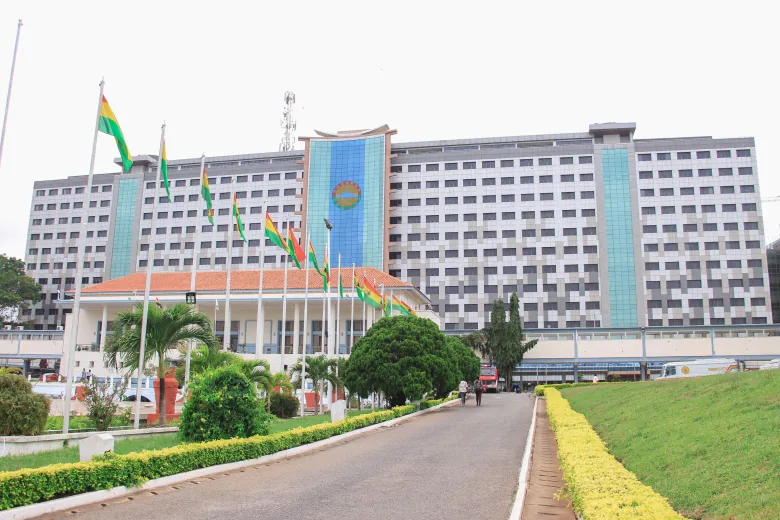- ‘It feels very exciting that we could change the course of history,’ says MP who tabled the bill
When Francis-Xavier Kojo Sosu delivered the news to a death-row inmate that Ghana had abolished capital punishment, he says the man smiled brightly, then wept.
“And when I asked, why are you crying? He says they can’t believe that they’ve been translated from death to life,” Sosu, a human rights lawyer and Ghanaian member of Parliament, told As It Happens guest host Robyn Bresnahan.
“He recounted that on a daily basis, when they wake up in the condemned cells, they look toward the direction of the gallows, and what they know is that their life could be taken any day. And so they die on a daily basis.”
Sosu tabled the bill to remove the death penalty from Ghana’s criminal code, which passed on Tuesday. The country’s president is expected to sign it into law soon, formalizing what has been a de facto moratorium on executions in Ghana for the past three decades.
In doing so, Ghana will join dozens of other African countries that have struck the colonial-era practice from their books in recent years.
“The death penalty is very, very archaic,” Sosu said. “So in terms of punishment, many nations are moving away from an eye for an eye, because then you create only a society of blind people.”
Last execution was in 1993
According to the advocacy group World Coalition Against the Death Penalty, 26 African countries had outlawed the death penalty outright as of 2022, while Ghana and 14 others had unofficially discontinued the practice.
Sosu says the death penalty is not popularly accepted by Ghanaians, and that’s why no president has signed an inmate’s death warrant in decades.
Ghana’s last state execution was in 1993.
“By and large the general populace have accepted that [the death penalty] may not be useful,” Francis Gasu, a criminal lawyer based in Ghana’s capital Accra, told The Associated Press.
Still, not everyone agrees with the change.
“It is going to encourage some people to engage in crime knowing that they will only end up in prison after conviction,” said Raymond Kuudaah, a social worker in Accra.
Amnesty International, a global human rights group, says there is no evidence that capital punishment deters crime.
In 2004 in the U.S., the average murder rate for states that used the death penalty was 5.71 per 100,000 of the population, about 26 per cent higher than in states that did not use it, Amnesty says.
In 1975, the year before the death penalty was abolished in Canada, the homicide rate was 3.02 per 100,000, according to Statistics Canada. In 2021, last numbers available, it was 2.06 homicides per 100,000 — a drop of nearly 32 per cent.
Life sentences mean better conditions
While Ghana has long stopped executing inmates, people have continued to be sentenced to death. That’s because the law mandated capital punishment for murder convictions.
When the new bill comes into effect, the sentences of 176 death row inmates will be commuted to life imprisonment.

Sosu says this change in sentencing is a lot more than a technicality. For those on death row, it will mean a dramatic improvement in their living conditions.
“It’s so traumatizing to be on death row in Ghana, because … lifers have more freedom in the prison. They have more access to recreation. They have more access to even sanitation,” he said.
“Those on death row typically live in what we call the condemned cells. And the condemned cells are isolated prisons. And it’s a dark place with limited air and with limited light.”
He says having an inmate sitting in a dark cell, waiting for an execution that may never come, does no good for either perpetrators or victims of crime.
High treason still carries death penalty
Sosu, who has worked directly with death-row inmates, says the fight isn’t over.
He says he would like to see his country continue to move towards a restorative criminal justice system that puts more emphasis on caring for victims than punishing perpetrators.
What’s more, the death penalty in Ghana is still legal in the case of high treason. That policy is entrenched in the country’s constitution, and can’t be removed with a simple parliamentary vote.
“The high treason in reality is a law, again, that is also a colonial relic that we are yet to deal with,” Sosu said. “We’ll put it to a referendum so we can settle permanently the issue of the death penalty in Ghana.”
While he has eyes set on the future, he’s still celebrating this political victory right now.
“I think it’s so great,” he said. “It feels very exciting that we could change the course of history.”
Source: CBC Radio





